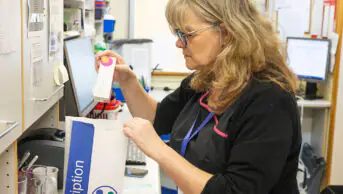
RayArt Graphics / Alamy
Some community pharmacies in Wales will be able to receive electronic discharge information from hospitals from March 2015, the Welsh government has confirmed. The pharmacies currently rely on discharge information being faxed or brought to them by patients — allowing a discharge medicines review to be conducted.
Once the system goes live, an email alert will be sent to each patient’s nominated pharmacy when he or she is discharged from hospital. At the same time, an electronic, pharmacy-specific version of the patient’s discharge advice letter will be made available for the pharmacist to access through a secure electronic portal. This version is expected to include all medicines prescribed for a patient at discharge, along with information on those that were stopped or changed during the hospital admission.
“The intention is to implement the [pilot in] the 32 pharmacies in Cwm Taf and Betsi Cadwaladr health board areas taking part in the ‘Choose Pharmacy’ common ailments service,” says a Welsh Government spokesperson. “It may also be available to a small number of pharmacies outside these two areas in the pilot phase.”
An update on the project is included in a report by the National Assembly for Wales’s health and social care committee on the progress of an inquiry into the contribution of community pharmacy to health services.
The committee welcomes the advances being made regarding access to discharge information for community pharmacies and wants to see the same progress elsewhere. “The committee expects the Welsh Government and relevant professions to work together to deliver similar progress for the sharing of information with community pharmacy in the context of other services,” the report states.
The committee also reports that health minister Mark Drakeford expects a national specification for a pharmacy-based smoking cessation service to be finalised in early 2015.
It also reveals that plans to develop a pharmacy-based chronic conditions service were, in Drakeford’s words, “not in the top part of our agenda at the moment”.
According to the committee’s report, Drakeford had said that two of the three key components of the equivalent Scottish service — i.e. a medicines use review and a repeat prescribing service — are in place in Wales. However, the third component, a patient registration scheme, is not. “Part of the reason we do not have it, is that it is pretty controversial out there in the community pharmacy and pharmacy world,” Drakeford says in the report.
The committee has asked Drakeford to consider establishing a working group between GPs and community pharmacists to accelerate the process of building consensus between the two professions.
In May 2012, the National Assembly for Wales’s health and social care committee reported the results of its inquiry into the contribution of community pharmacy to health services. In its response to that report, announced in July 2012, the Welsh Government accepted all seven of the committee’s recommendations. The latest report, published as a letter to the health minister in November 2014, examines the progress made against those recommendations.


